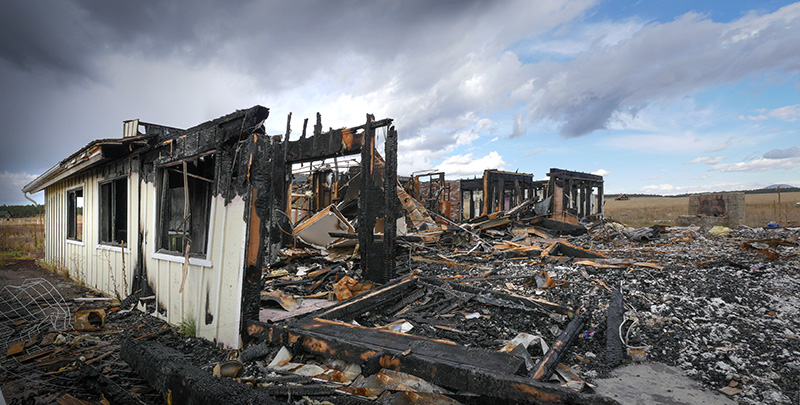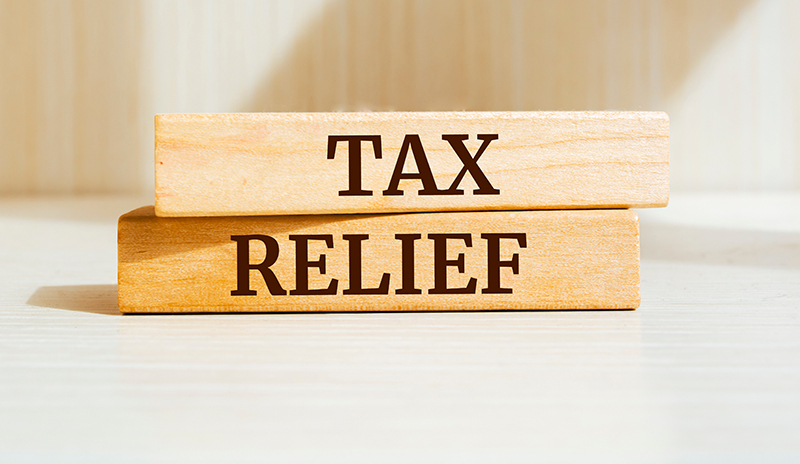My house burned down. Is that deductible on my taxes?
February, 24 2022 by Carolyn Richardson, EA, MBA
It’s probably one of the worse things that can happen to you on a personal level – the loss of your home due to fire. Gone are all the possessions and memories associated with them, sometimes from generations past. While some things may be salvageable, in most house fires, the damage from water and smoke means the loss of property even if the house is not a total write off. Is there some relief from the government in the form of a tax break? Like many things in taxes, this can depend on different things, such as what caused the fire.
Casualties occur when the taxpayer’s property suffers an “involuntary conversion” from fire, storm, shipwreck, or similar events. Prior to the enactment of the Tax Cuts and Jobs Act of 2017, a house fire would usually result in a deductible personal casualty loss for losses incurred that were not reimbursed by insurance, but the TCJA suspended casualty and theft losses for most taxpayers unless it was the result of a federally declared disaster, making many of these losses incurred before January 1, 2026, nondeductible. Business casualty and theft losses continue to be deductible.
To qualify as a casualty or disaster, the damage or loss to the property must have been the result of a sudden, unexpected, or unusual event, and not from gradual or progressive deterioration. For example, the destruction of a home in a hurricane or earthquake would be considered a casualty, even if the home is located in an area where fires or earthquakes happen frequently, such as Florida and California. However, the collapse of a structure due to termite damage would not be a deductible casualty. The logic behind this distinction is that the taxpayer could have prevented a loss in a gradual or progressive deterioration. Casualties caused by the taxpayer’s actions, such as arson or willful neglect, are not deductible.
Generally, you must be able to itemize deductions to claim a casualty loss. Casualty losses are first calculated on Form 4684, Casualties and Thefts, and the net loss is carried to Schedule A, Itemized Deductions (some qualified disaster losses do not require you to itemize to claim your casualty loss). Form 4684 is used for both personal casualties (Section A) and business or income-producing property casualties (Section B). Section C of the form is used for losses from “Ponzi-type” schemes, and Section D is used by taxpayers who have qualified disaster losses to make the election to carryback the casualty loss to the preceding tax year.
There are three kinds of federally declared losses that currently qualify for deduction:
- Federal casualty losses: In order for the loss to be deductible, it must be a federally declared disaster loss. This means that the disaster is determined to warrant assistance under the Stafford Act. Federally declared disasters include major disaster designations and emergency designations. The disaster must occur in a state that is receiving a federal disaster designation.
- Disaster Loss: To qualify as a disaster loss, the taxpayer’s casualty loss must occur in a county eligible for public or individual assistance as part of a Presidentially declared disaster designation. These losses may be incurred for both the loss of personal-use property in addition to business property or income-producing property. Disaster losses may be deducted in the year they occur or in the previous tax year.
- Qualified Disaster Loss: Generally, “qualified” disaster losses are specified disaster losses that receive special tax treatment under specific legislative acts. Like the other losses, they must be declared by the President under Section 401 of the Stafford Act. Qualified disaster losses include losses from the following events:
- Hurricanes Harvey, Irma, and Maria, and Tropical Storm Harvey;
- California wildfires of 2017 and the resulting mudslides in January 2018;
- Any major disaster declared by the President that occurred in 2018 and before December 21, 2019, and continued no later than January 19, 2020.
- Any major disaster declared by the President between January 1, 2020, and February 25, 2021, for incident periods between December 28, 2019, and December 27, 2020, with an incident period ending no later than January 28, 2021.
- Please note: Losses incurred only by reason of the COVID-19 pandemic are not qualified disaster losses.
If you are not certain if your loss was from a federally declared disaster, you can look it up here: https://www.fema.gov/disaster/declarations.
Only physical damages to the property are deductible. A decrease in value of the property due to the possibility of a future casualty is not deductible, nor are decreases in value from other circumstances such as the neighboring environment, or a temporary decline in market value because of the casualty.
If your house burned down and it was not caused by a natural disaster such as a wildfire or storm, you probably cannot deduct any loss not covered by insurance. An exception to this would be if you had a gain arising from a casualty in the same year. If that is the case, you can use the loss to offset the taxable casualty gain.
One important thing to remember when trying to determine if you had a casualty loss or gain is that the IRS will generally only permit the loss if it can be documented through independent means, such as an appraisal specifically prepared for the determining the amount of loss to the fair market value (FMV) of the property. The loss amount is determined by subtracting the post-casualty FMV from the pre-casualty FMV. The costs you pay to repair or replace your property may be allowable, but are not always an indicator of the change in fair market value, which is what the law requires. Even insurance company appraisals can be rejected by the IRS, as they are not usually performed with an eye to the loss of fair market value, but are prepared to determine the cost of repairs.
Surviving a major catastrophe is stressful even with the support of family and your community. You don’t want to add to that stress by having the IRS questioning your losses, possibly several years after the tragedy.





